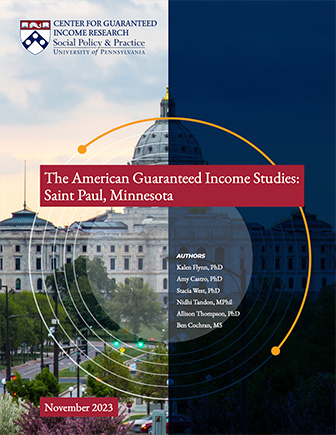People's Prosperity Pilot (PPP)
The People's Prosperity Pilot was launched in 2020 by Mayor Melvin Carter.
150
participants
$500
monthly payment
1.5 Years
duration
$1,350,000
invested in community
The People's Prosperity Pilot was launched in 2020 by Mayor Melvin Carter.
150
participants
$500
monthly payment
1.5 Years
duration
$1,350,000
invested in community
| Program Features | |
|---|---|
| Number of Participants | 150 individuals |
| Amount | $500 |
| Frequency | monthly |
| Program Dates | October 2020-March 2022 |
| Eligibility | St. Paul resident with a child with a CollegeBound Saint Paul college savings account and has been impacted financially by COVID-19. |
The City of Saint Paul launched the People’s Prosperity Guaranteed Income Pilot in October 2020. The People’s Prosperity Pilot was offered to families participating in CollegeBound Saint Paul, the City’s college savings initiative, which is providing every child born to a Saint Paul resident on or after January 1, 2020 with a college savings account and a $50 seed deposit. In an effort to build families’ wealth while supporting their income, their child also received a monthly $10 bonus deposit in their CollegeBound Saint Paul account. The People's Prosperity Pilot was the first guaranteed income program run inside city government and with public funds through the CARES Act and MN Department of Human Services.
Pilot concluded in 2022.
$44,797
$38,000
21.2%
20%
37.3%
31%
31.2%
40%
8.5%
8%
STOCKTON
STATE MEDIAN

Read a research report produced by the Center for Guaranteed Income Research (CGIR) which offers summaries of key findings, along with in-depth analyses of both quantitative and qualitative data from this pilot.
download the report
The guaranteed income pilot launched during a period of dynamic change and economic challenges for pilot participants. The chart below situates this pilot in the context of unemployment and inflation.
The data in this pie chart shows aggregate spending for guaranteed income participants in St. Paul, MN (PPP). This includes all non-cash expenditures from the participants' pre-paid debit card that is loaded with guaranteed income payments monthly.
Spending breakdown
Retail sales and services accounted for the largest share of spending, at 55.35%, followed by Food and groceries (28.05%) and Transport related expenses (5.74%).